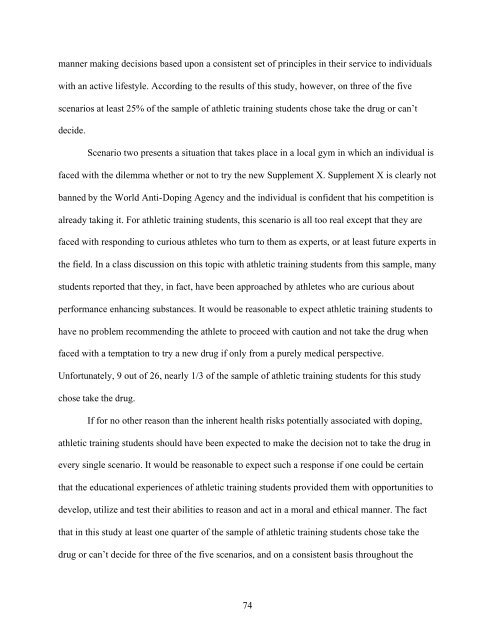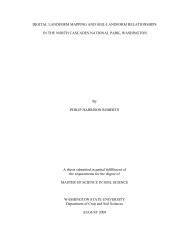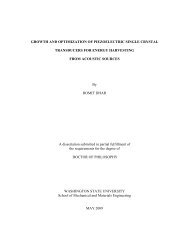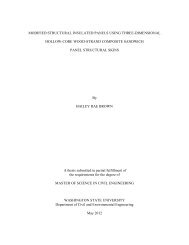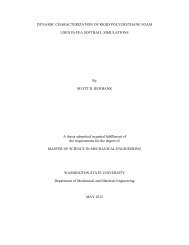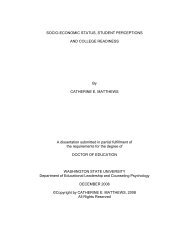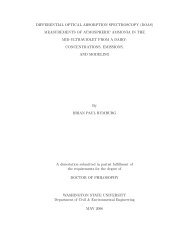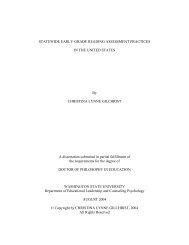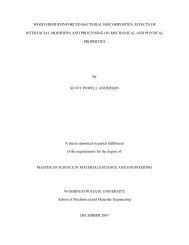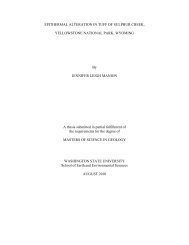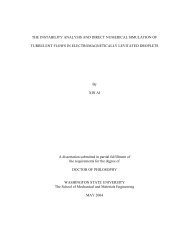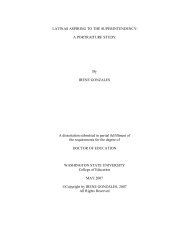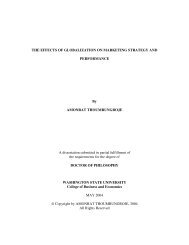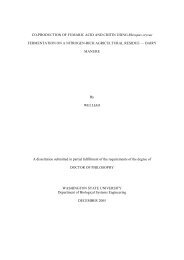the moral reasoning of student athletes and athletic training students
the moral reasoning of student athletes and athletic training students
the moral reasoning of student athletes and athletic training students
Create successful ePaper yourself
Turn your PDF publications into a flip-book with our unique Google optimized e-Paper software.
manner making decisions based upon a consistent set <strong>of</strong> principles in <strong>the</strong>ir service to individuals<br />
with an active lifestyle. According to <strong>the</strong> results <strong>of</strong> this study, however, on three <strong>of</strong> <strong>the</strong> five<br />
scenarios at least 25% <strong>of</strong> <strong>the</strong> sample <strong>of</strong> <strong>athletic</strong> <strong>training</strong> <strong>student</strong>s chose take <strong>the</strong> drug or can’t<br />
decide.<br />
Scenario two presents a situation that takes place in a local gym in which an individual is<br />
faced with <strong>the</strong> dilemma whe<strong>the</strong>r or not to try <strong>the</strong> new Supplement X. Supplement X is clearly not<br />
banned by <strong>the</strong> World Anti-Doping Agency <strong>and</strong> <strong>the</strong> individual is confident that his competition is<br />
already taking it. For <strong>athletic</strong> <strong>training</strong> <strong>student</strong>s, this scenario is all too real except that <strong>the</strong>y are<br />
faced with responding to curious <strong>athletes</strong> who turn to <strong>the</strong>m as experts, or at least future experts in<br />
<strong>the</strong> field. In a class discussion on this topic with <strong>athletic</strong> <strong>training</strong> <strong>student</strong>s from this sample, many<br />
<strong>student</strong>s reported that <strong>the</strong>y, in fact, have been approached by <strong>athletes</strong> who are curious about<br />
performance enhancing substances. It would be reasonable to expect <strong>athletic</strong> <strong>training</strong> <strong>student</strong>s to<br />
have no problem recommending <strong>the</strong> athlete to proceed with caution <strong>and</strong> not take <strong>the</strong> drug when<br />
faced with a temptation to try a new drug if only from a purely medical perspective.<br />
Unfortunately, 9 out <strong>of</strong> 26, nearly 1/3 <strong>of</strong> <strong>the</strong> sample <strong>of</strong> <strong>athletic</strong> <strong>training</strong> <strong>student</strong>s for this study<br />
chose take <strong>the</strong> drug.<br />
If for no o<strong>the</strong>r reason than <strong>the</strong> inherent health risks potentially associated with doping,<br />
<strong>athletic</strong> <strong>training</strong> <strong>student</strong>s should have been expected to make <strong>the</strong> decision not to take <strong>the</strong> drug in<br />
every single scenario. It would be reasonable to expect such a response if one could be certain<br />
that <strong>the</strong> educational experiences <strong>of</strong> <strong>athletic</strong> <strong>training</strong> <strong>student</strong>s provided <strong>the</strong>m with opportunities to<br />
develop, utilize <strong>and</strong> test <strong>the</strong>ir abilities to reason <strong>and</strong> act in a <strong>moral</strong> <strong>and</strong> ethical manner. The fact<br />
that in this study at least one quarter <strong>of</strong> <strong>the</strong> sample <strong>of</strong> <strong>athletic</strong> <strong>training</strong> <strong>student</strong>s chose take <strong>the</strong><br />
drug or can’t decide for three <strong>of</strong> <strong>the</strong> five scenarios, <strong>and</strong> on a consistent basis throughout <strong>the</strong><br />
74


